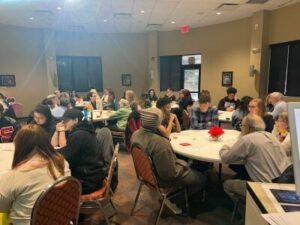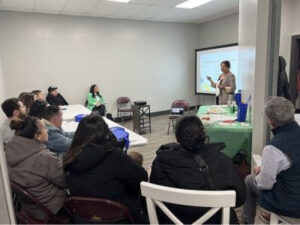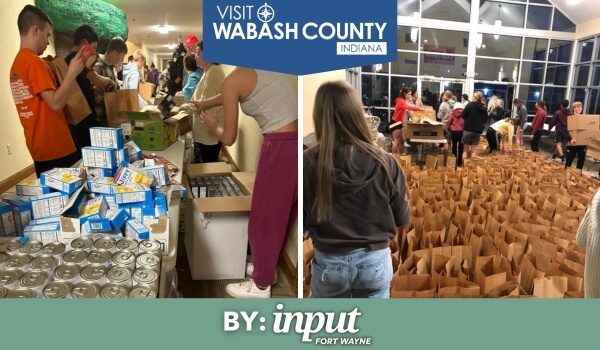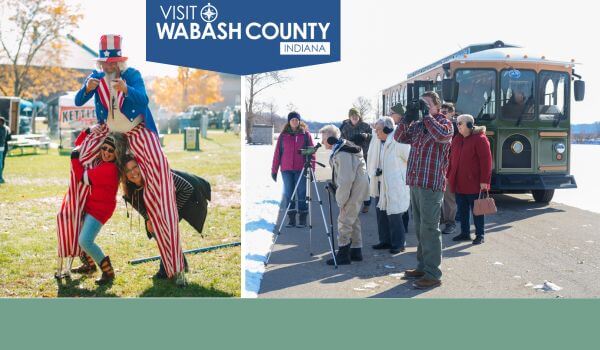Wabash County’s Secret to Growth? Building a welcoming culture
By: INPUT Fort Wayne

The Wabash County Diversity Coalition is imagining a future where inclusivity and belonging for every resident are the standards.
Established in 2019 as an initiative by Wabash’s Mayor Scott Long, the coalition has evolved into a formalized organization dedicated to addressing diversity-related challenges and opportunities in the community.
“We knew Wabash County had been experiencing population decline, and we wanted to figure out how to attract and retain diverse talent,” explains Mackenzie Coulter-Kern, who became the Wabash County Diversity Coalition’s director in January 2024. “We’ve also seen an increasing number of Spanish speakers in the county who need support accessing services and integrating into the community.”
According to data from STATS Indiana, Wabash County had a population of 30,777 in 2024, compared to 30,976 in 2020. More than 1,000 people, or 3.5% of the county, identified as Hispanic or of Latino origin in 2024.
The coalition’s work is guided by this demographic and a needs analysis conducted by Coulter-Kern, who holds both a master’s and a doctorate in Hispanic Linguistics from Indiana University. The work involved surveying more than 50 businesses and stakeholders and interviewing Spanish-speaking residents. The findings shaped the coalition’s focus on three key areas: safety, education, and outreach.

One of the coalition’s most visible initiatives is the annual Hispanic Heritage Festival in September, which celebrates the county’s growing Hispanic population and its culture.
“Last year, we were thrilled to welcome around 1,100 attendees,” says Coulter-Kern. “The festival emerged from a desire expressed by Spanish-speaking residents to celebrate that Wabash County is their home, too.”
The coalition also collaborates with local organizations to provide resources and support for newcomers. This includes a monthly Life Navigator course at the North Manchester Public Library, which offers information on healthcare, education, and community resources in both English and Spanish. Additionally, the coalition has partnered with the Northeast Indiana Innovation Center (NIIC) to host entrepreneurship workshops in Spanish, empowering residents to start and grow businesses.

This year, in partnership with Visit Wabash County and Manchester Alive, Coulter-Kern, along with a leadership committee, helped produce the first-ever printed and digital Spanish Resource Guide to meet the needs of the growing Spanish-speaking population within the county. The guide is available at the Visit Wabash County Welcome Center, on the Visit Wabash County website, and has been distributed to key employers throughout the county.
Education is front and center in their work. According to Coulter-Kern, they work closely with local schools and dual-language immersion programs. They also frequently collaborate with The Learn More Center, which offers English language learner classes, and have partnered with them to offer citizenship courses. In her words, “we want everyone to feel safe and welcome in Wabash County.”
Coulter-Kern is proud to share that the coalition is pursuing a Certified Welcoming designation through Welcoming America, a national organization that recognizes communities with inclusive policies and programs. According to Welcoming America, “Certified Welcoming is a formal designation for cities and counties that have created policies and programs reflecting their values and commitment to immigrant inclusion.”
To earn this designation, these communities have taken intentional steps to welcome immigrants in all areas of civic, social, and economic life. According to Coulter-Kern, the process involves meeting criteria such as ensuring language access in schools and fostering positive relationships with law enforcement.
“This certification shows that Wabash County is a place where everyone can feel at home,” she says.

Allen County is currently the only county in Indiana to receive that designation, making Wabash County the second should their application be successful.
Coulter-Kern acknowledges the importance of collaboration in achieving the coalition’s goals, calling out support from the Community Foundation of Wabash County, local businesses, and community leaders. As she contends, this work wouldn’t be possible without their mentorship and guidance.
As the coalition continues to grow, it remains focused on creating a welcoming environment for all residents. In the past, the coalition has relied primarily on qualitative feedback to gauge the success of its efforts. But this approach doesn’t necessarily capture the full picture, Coulter-Kern says. To that end, she has her sights set on developing a strategic welcoming plan. If selected as an awardee for the Gateways for Growth Challenge, the support would help them gather data on the economic contributions of immigrants in the area. Through this initiative, awardees receive research support and technical assistance from the American Immigration Council and Welcoming America to improve immigrant inclusion in their communities.
“Wabash County and the City of Wabash are a culturally diverse community,” says City of Wabash Mayor Scott Long. “Not only do we have an increasing Latino population, but we also have several Japanese citizens, as well as natives from all over our globe. As Wabash strives for investment from throughout the world, diversity and inclusivity of all people within the county is a key to attracting Foreign Direct Investment. We welcome all people and strive to quickly acclimate them into the county and ensure that the services and goods they are accustomed to are available.”
“Our ultimate measure of success is whether our population grows,” Coulter-Kern adds. “We want Wabash County to be a place where everyone feels they belong.”

Through its initiatives and partnerships, the Wabash County Diversity Coalition is not only addressing immediate needs but also laying the foundation for a more inclusive and vibrant community.
As Coulter-Kern put it, “This is about making Wabash County a place where everyone can thrive.”
This story was created in partnership with Visit Wabash County.



